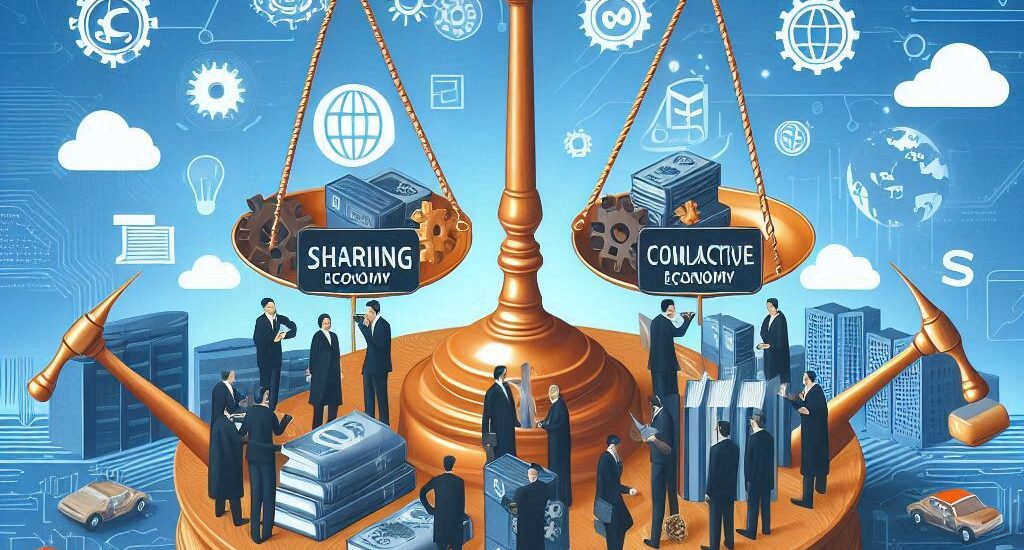~Sura Anjana Srimayi
Kelkar College, Mulund East, Mumbai
INTRODUCTION
The sharing economy also referred to as the collaborative economy or peer-to-peer economy, has revolutionized how we acquire goods and services. It challenges conventional ownership structures and promotes a system where people can make use of underutilized assets or skills for mutual gain.
Prioritizing access to resources over ownership, the sharing economy enables individuals to meet their needs without the full responsibility of ownership and upkeep expenses.
Transactions often occur directly between individuals, bypassing traditional middlemen, resulting in reduced costs and increased flexibility for both providers and users.
Collaborative consumption platforms, also known as sharing economy platforms, link individuals to share, borrow, or rent resources and services. This approach encourages a more efficient and sustainable method of meeting various needs compared to traditional ownership models.
BENEFITS OF THE SHARING ECONOMY AND ITS COLLABORATIVE CONSUMPTION PLATFORMS
The sharing economy has instigated a surge in job opportunities for drivers, service providers, and platform workers, thereby bolstering economic growth. Collaborative consumption platforms enhance resource allocation efficiency by tapping into underutilized assets. Moreover, the emergence of sharing economy platforms has nurtured an entrepreneurial spirit, fostering the creation of startups tailored to specific market niches.
Promoting sustainable consumption practices, the sharing economy advocates for resource sharing over individual ownership. Accommodation services such as OYO and Airbnb connect travelers with diverse, cost-effective lodging options, benefiting property owners by enabling them to monetize unused spaces. Furthermore, ride-hailing apps like Ola and Uber revolutionize the transportation sector by offering on-demand taxi services, challenging conventional taxi services, and providing flexible income opportunities for drivers.
Platforms like Urbanclap and TaskRabbit facilitate skill sharing by linking individuals in need of services like home maintenance with proficient professionals, enabling skill monetization for providers and convenient access to services for users.
LEGAL LANDSCAPE: NAVIGATING THE LEGAL EFFECTS
- The concept of the sharing economy, also referred to as collaborative consumption, thrives on facilitating direct sharing, renting, or borrowing of resources and services among individuals. In India, the dynamic sharing economy has experienced substantial growth, yet legal considerations continue to evolve in this realm. The terms sharing economy and collaborative consumption are often used interchangeably, representing digital platforms that enable peer-to-peer transactions within this ecosystem. These platforms serve to connect individuals, such as drivers and riders, or link individuals with service providers, like home repair professionals and clients.
In India, the legal landscape surrounding the sharing economy is a work in progress. Several crucial aspects merit attention:
Regulatory Void: Presently, there is no comprehensive legislation governing all facets of the sharing economy. Platforms typically operate under an amalgamation of existing regulations specific to their respective sectors (e.g., transportation, hospitality).
- Intermediary Guidelines & Platform Accountability: The Information Technology (Intermediary Guidelines and Digital Media Ethics Code) Rules of 2021 outline certain obligations for platforms, including user authentication, content moderation, and potential liability for illicit activities facilitated through their services.
- Consumer Safeguards: Current consumer protection laws extend to transactions conducted on these platforms, safeguarding users’ rights concerning equitable treatment, grievance resolution, and data protection.
- Taxation Considerations: The tax treatment of earnings accrued by individuals participating in the sharing economy is an evolving domain. Platforms may be required to facilitate tax collection in certain instances.
- Employment Regulations: Determining the employment status of individuals engaged in these platforms (e.g., ride-hailing drivers) is pivotal to ensure they receive appropriate benefits and social security coverage.
Challenges and Ambiguities:
- Regulatory Ambiguity: The absence of specific regulations can engender uncertainty for both platforms and users.
- Data Privacy Issues: Platforms amass and retain user data, prompting concerns about data security and privacy.
- Dispute Resolution Mechanisms: Establishing efficient and equitable mechanisms to settle disputes among users or between users and platforms is imperative.
The Indian government is working on formulating a regulatory framework for the sharing economy
- Sector-Specific Regulations: Regulations tailored to specific sectors within the sharing economy (e.g., transportation, hospitality) might be implemented.
- Focus on Consumer Protection and Data Privacy: Regulations might emphasize user safety, fair treatment, and data security.
- Clarification on Platform Liability: The extent of platform liability for user activity might be further defined.
- Social Security for Sharing Economy Workers: The status and benefits for individuals working in the sharing economy might be clarified.
Collaborative consumption platforms play a pivotal role in India’s sharing economy. To cultivate a robust and equitable ecosystem that encourages innovation safeguards consumer interests, and upholds fair labor standards, it is imperative for India to tackle legal and regulatory ambiguities effectively. Such measures are essential for nurturing the sustainable advancement of the sharing economy within the nation.
References:
Team, C. (2023, October 17). Sharing economy. Corporate Finance Institute. https://corporatefinanceinstitute.com/resources/economics/sharing-economy/
Anwar, S. T. (2022). The sharing economy and collaborative consumption: Strategic issues and global entrepreneurial opportunities. Journal of International Entrepreneurship, 21(1), 60–88. https://doi.org/10.1007/s10843-022-00323-0
https://www.researchgate.net/publication/371694689_THE_SHARING_ECONOMY’S_SUCCESS_ADVANTAGES_DRAWBACKS_AND_APPLICATIONS
Werle, F. (2022, February 2). 7 Legal Issues to Consider in the Sharing Economy – docurex® Dataroom. docurex® Dataroom. https://www.docurex.com/en/7-legal-issues-to-consider-in-the-sharing-economy/



